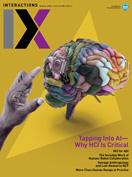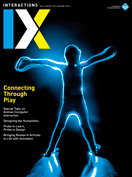Authors:
INTR Staff
 Research Contributions in Human-Computer Interaction
Research Contributions in Human-Computer Interaction
By Jacob Wobbrock and Julie Kientz
May–June 2016
DOI: 10.1145/2907069
Great analysis and insight. Here is a point to ponder for the CHI committee members (and the rest of the community).
The authors state that "if empirical findings are uninteresting or unimportant ... then empirical contributions are judged unfavorably." I am sure that many researchers have had their methodologically sound work rejected at HCI conferences for these precise reasons.
Is it acceptable to a scientific community that work would be rejected on such a partial, subjective basis? Uninteresting? To whom? For what reasons? Unimportant? In what context? To whose work?
The entire field of science is rife with examples of work whose value did not become apparent until years—or decades—later, when other technological and theoretical conditions matured enough to make the contribution relevant. As a simplistic example, take Einstein's theory of relativity, without which it would have been impossible to implement the global positioning system (GPS).
Some would argue that leading conferences have a responsibility not only to promote a diversity in submissions, but also to ensure that the criteria for reviews are clearly set and appropriate to a scientific field. We must also not forget that many of the reviews are undertaken by junior researchers, for whom reviewing papers is part of their formative process and whom experienced researchers, such as PC members, have a responsibility to help develop. As such, criteria for quality reviews must not only be set but also enforced.
Criteria for quality reviews must not only be set but also enforced.
CHI's rebuttal mechanism is a step in the right direction, but it places the burden of proof on the authors, not the PC members who are solely responsible for picking appropriate reviewers. But it is not enough—serially bad reviewers are not excluded (or given time off) from the process. Submitters who are also reviewers often have "skin in the game," which may bias reviews. Papers that critique work in previous literature are given to the authors of the criticized work to review (since they are regarded as experienced in that field), who of course have many reasons for putting down that work.
Of course, this is all human nature, and in a world where conferences are always short of people to do reviews, these phenomena will never go away. But without a proper and commonly agreed upon mechanism for feedback on the quality of reviews, as well as for enforcing the criteria appropriate to reviewing, we are doing no better than hoping "it will all work out OK in the end."
Andreas
 How Was It Made? Lichtsuchende
How Was It Made? Lichtsuchende
January–February 2016
Dave Murray-Rust, Rocio von Jungenfeld
DOI: 10.1145/2853201
This is a delightful homage to Gordon Pask's "The Colloquy of Mobiles": http://www.medienkunstnetz.de/works/colloquy-of-mobiles/
In Pask's installation, the mobiles communicated with each other and with the audience through light and sound as part of a learning process that conditioned their behavior over time. Is this something you are exploring with Lichtsuchende?
Kristian Kloeckl
 What If HCI Became a Fashion-Driven Discipline?
What If HCI Became a Fashion-Driven Discipline?
By Yue Pan and Erik Stolterman
November–December 2015
DOI: 10.1145/2828430
Yes, UI design (not the discipline of HCI, of course) has become a fashion-driven craft and this is a catastrophe to our profession (and users).
Ivan
 Blog/Jonathan Grudin: Wrong About MOOCs
Blog/Jonathan Grudin: Wrong About MOOCs
http://interactions.acm.org/blog/view/wrong-about-moocs1
I enjoy reading your blog posts but rarely comment, mainly because they are "food for thought" that don't necessarily provoke an immediate reaction—but one might surface eventually. I imagine this could be similar for others. And because they are not peer-reviewed and might be tangential to your work they are not likely to get cited, so you don't get feedback in the way a published article would.
All of which stands alongside the fact that the blogging ecosystem of RSS reading and citation seems to be almost dead, which I find a pity. I tend to agree with Hossein Derakhshan (e.g., in his Guardian article: https://www.theguardian.com/technology/2015/dec/29/irans-blogfather-facebook-instagram-and-twitter-are-killing-the-web) about the dynamics of social networks killing the linking ecosystem, but would be interested to hear how you see it.
Lilia Efimova
©2016 ACM 1072-5220/16/07 $15.00
Permission to make digital or hard copies of all or part of this work for personal or classroom use is granted without fee provided that copies are not made or distributed for profit or commercial advantage and that copies bear this notice and the full citation on the first page. To copy otherwise, to republish, to post on servers or to redistribute to lists, requires prior specific permission and/or a fee.
The Digital Library is published by the Association for Computing Machinery. Copyright © 2016 ACM, Inc.







Post Comment
No Comments Found